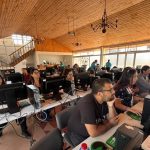Medicine: New analysis helps discern benign from malignant thyroid growths
By Patricia Waldron New York, May 14, 2025.- Telling the difference between benign and cancerous thyroid nodules before surgery is notoriously challenging, but a new study finds that a combination of artificial intelligence and data analysis techniques may yield surprisingly accurate cancer predictions. The proof-of-concept study was conducted by researchersContinuar Leyendo


















